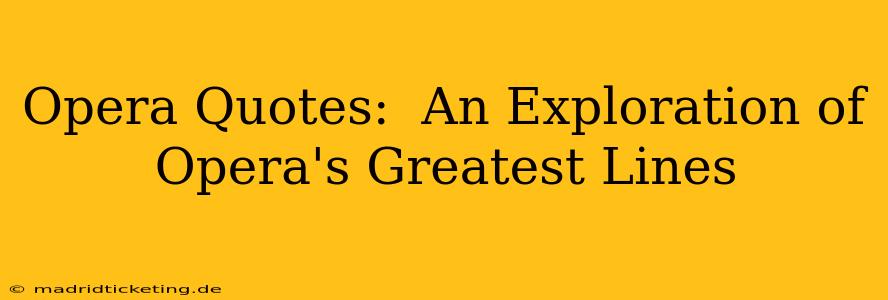Opera, a genre blending music, drama, and spectacle, has gifted the world with some of the most emotionally resonant and intellectually stimulating lines in the history of art. These aren't just words; they are expressions of profound human experience, capturing the heights of passion, the depths of despair, and everything in between. This exploration delves into some of opera's greatest quotes, examining their context, impact, and enduring legacy. We'll explore the power of these phrases to move audiences across centuries and cultures.
Why Are Opera Quotes So Memorable?
Opera's unique power lies in its synthesis of music and text. The melodic delivery amplifies the emotional weight of the words, etching them into the listener's memory far more effectively than spoken dialogue. Furthermore, the dramatic situations within operas often involve intense emotions – love, betrayal, revenge, loss – making the accompanying quotes inherently memorable. Great operatic lines are often carefully crafted to be both poetic and emotionally potent, resonating long after the curtain falls. The combination of soaring melodies and powerful lyrics creates an unforgettable experience.
"Nessun dorma!" (from Turandot by Giacomo Puccini)
Perhaps the most famous opera quote globally, "Nessun dorma!" ("Let no one sleep!") from Puccini's Turandot, is a powerful declaration of unwavering hope and determination. Sung by Calaf, the prince who is determined to win the hand of the icy Princess Turandot, it’s a testament to his unwavering pursuit of love despite facing seemingly insurmountable odds. The soaring melody and the potent lyrics have solidified its place in popular culture, transcending the opera world and becoming a symbol of perseverance.
What Makes "Nessun dorma!" So Iconic?
The sheer power and optimism expressed in the aria, coupled with Puccini's unforgettable melody, contribute to its lasting appeal. The phrase embodies a universal feeling: the persistent hope even in the face of adversity. This makes it relatable to a broad audience, and its use in various contexts beyond opera underlines its enduring relevance.
"E lucevan le stelle" (from Tosca by Giacomo Puccini)
Another Puccini masterpiece, "E lucevan le stelle" ("And the stars were shining") from Tosca, is a heartbreaking lament sung by Cavaradossi, moments before his execution. This aria is not just a beautiful piece of music; it's a profoundly moving expression of regret, longing, and acceptance of fate. The simplicity of the words enhances the poignancy of the moment, evoking a powerful sense of loss and sorrow.
How Does "E lucevan le stelle" Evoke Such Deep Emotion?
The contrast between the beautiful melody and the tragic context creates an overwhelming emotional impact. The lyrics' simplicity, coupled with the heartbreaking circumstances of Cavaradossi’s imminent death, makes this aria intensely affecting. The reflective and remorseful tone further intensifies the audience's emotional connection.
"Queen of the Night Aria" (from The Magic Flute by Wolfgang Amadeus Mozart)
While not a single line, the "Queen of the Night Aria" is known for its high-pitched notes and demanding vocal range, reflecting the character’s fierce and vengeful nature. Its dramatic power and the sheer vocal athleticism required make it a highlight of The Magic Flute, and its iconic status within opera is undeniable.
Why is the Queen of the Night Aria So Famous?
The aria's difficulty, its association with a powerful and dramatic character, and the unforgettable melody combine to create a lasting impression on audiences. It represents a testament to the power of vocal virtuosity and the dramatic force that can be achieved through music. Its recognition transcends opera circles, frequently appearing in other media.
"O mio babbino caro" (from Gianni Schicchi by Giacomo Puccini)
This aria, “O mio babbino caro” (“Oh, my beloved father”), sung by Lauretta in Puccini's Gianni Schicchi, is a beautiful and touching plea for her father’s approval of her marriage. The simplicity and directness of the lyrics coupled with the sweet melody perfectly capture the innocence and passion of young love.
What Makes "O mio babbino caro" So Enduring?
The aria's appeal lies in its universal theme: the yearning for parental approval and the longing for love. The simplicity and directness of the lyrics, combined with the beautiful melody, make it incredibly relatable and touching. Its straightforwardness enhances the emotionality.
Conclusion
These are just a few examples of the countless powerful quotes that populate the world of opera. They represent not only the genius of the composers but also the enduring power of music and drama to explore the full range of human experience. The enduring legacy of these lines proves their ability to move audiences across generations, solidifying opera's position as one of the most powerful and impactful art forms.

